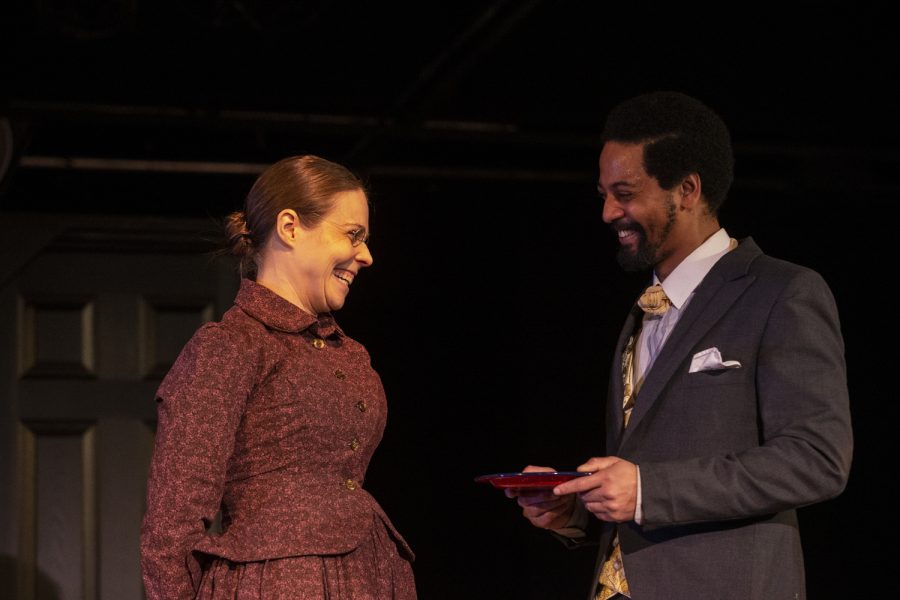Play comes to Iowa City theater to share tale of activists’ split in fight for equal rights
While many people know who the two activists Susan B. Anthony and Frederick Douglass were, many are unaware of their 45-year friendship that consisted of ups and downs, especially over the 15th Amendment.
Jessica Link offers Cutis M. Jackson some of her peach cobbler during a dress rehearsal of The Agitators at Riverside Theater on Tuesday, Jan. 21, 2020. The Agitators will show at Riverside from Jan. 24 – Feb. 16.
January 23, 2020
While touring the Susan B. Anthony House museum in Rochester, New York, playwright Mat Smart found out that the women’s rights leader was friends with abolitionist Frederick Douglass. The two were lifelong friends, but disagreed on the 15th Amendment, which granted African-American men the right to vote, but not women.
Commemorating the 100th anniversary of the women’s suffrage movement, The Agitators is set to run at Riverside Theater at 7:30 p.m. Friday.
Intrigued by these facts, Smart began to research the duo’s friendship, and realized their story is widely unknown to the public. After a year of researching, Smart wrote a play about Anthony and Douglass’ relationship, titling it The Agitators.
Along with the suffrage movement, The Agitators also runs through Feb. 16, during Black History Month, and plays on what would have been Susan B. Anthony’s 200th birthday.
“As I did more research, I learned that they had a lot of times where they came together and times they were really at odds with one another,” Smart said. “They have a really nuanced, complicated relationship that really reflects American history and the complications of American history.”
The Agitators plot spans over Anthony and Douglass’ 45-year relationship, heightening to the point where Anthony and Douglass argue over the 15th Amendment. Anthony was upset because she wanted everyone to have the right to vote, and so did Douglass, but he came towards the amendment with the mentality of, “if we can get this now, we need to get this,” Smart said.
“It’s sort of the domain problem with politics is like, do you go for the ideal or do you go for what you think you can get?” he said. “It was a very contentious sort of amendment, making activist groups fight against each other.”
Many of the scenes show Anthony trying to undo Douglass’ gender bias, and vice versa with Douglass trying to undo Anthony’s racial bias, despite the fact that both are working toward equal rights for everyone, ringing a bell that American politics remains true to its roots in today’s political arena. Even with their equal-rights platforms, a disconnect occurs because they are both fighting for different things, said Curtis Jackson, who plays Douglass.
“There are some very powerful words that Mat, the playwright wrote, and they say, “Lord — will you, one day, give us the strength to fight for each other as much as we fight for ourselves?” Jackson said.
Playing the role of such a respected leader in history required loads of research from both Jackson and Jessica Link, who plays Anthony. Jackson not only researched his character, but researched Anthony as well. With only two cast members in the show, both actors had to rely solely on one another’s skills, which Jackson described as an empowering and fascinating experience.
With no audio recordings or way to tell what kind of mannerisms either character had, Link says that they had to turn to their imaginations of what they would have been like, which leans into the fine line between being intimidating and freeing.
“What I love about this story is that it’s not just about who was Frederick Douglass or who was Susan B. Anthony,” she said. “It’s about who were they when they were with one another.”
Although fairly bare bones, The Agitators’ set brings forth a primary component to help with the lapse of time. A turntable has been built into the stage floor, and will help the story jump between scenes that have years or distance between one another, director Chris Okiishi said.
“We’re trying to surprise the audience each time, to get them to look at the actors and the stage in a different way every time a new scene starts,” he said.



